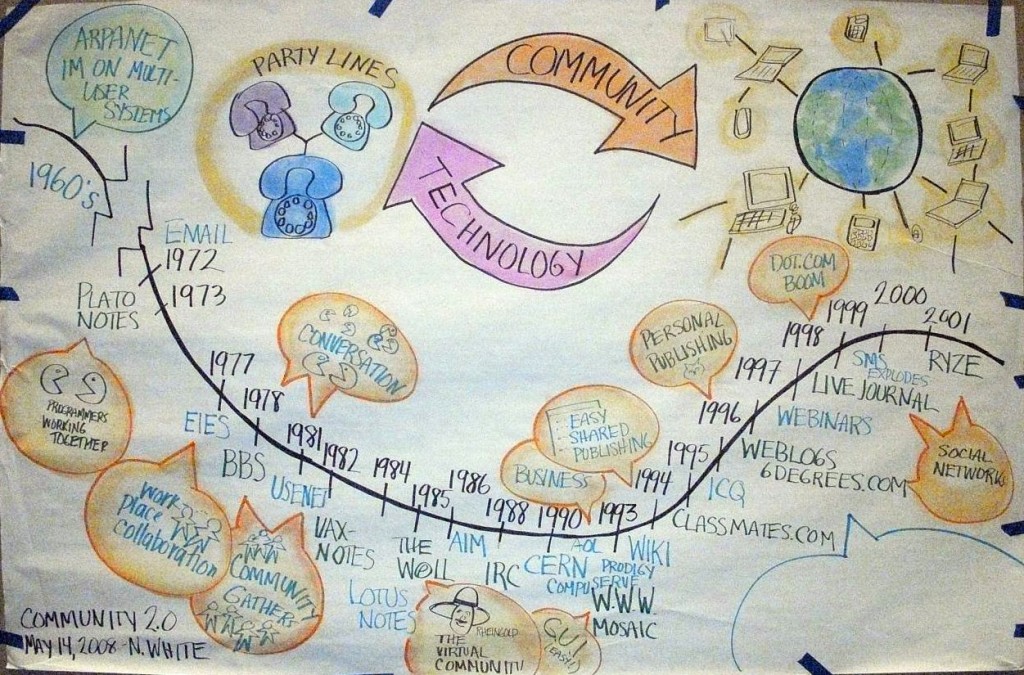 In just over a week I’ll be in Ft. Worth, Texas, opening Monday’s session of the Elearning 2010 Conference. My topic is “Online Facilitation 13 Years On: What We Learned and What Do We Need to Learn?” Despite all best intentions, I’m just now getting concrete on what I want to do in this more traditional ‘podium’ opportunity. There are so many things we could talk about. So I’m wondering, what is YOUR history of online facilitation? What are the key turning points for you? And what do you see in the future?
In just over a week I’ll be in Ft. Worth, Texas, opening Monday’s session of the Elearning 2010 Conference. My topic is “Online Facilitation 13 Years On: What We Learned and What Do We Need to Learn?” Despite all best intentions, I’m just now getting concrete on what I want to do in this more traditional ‘podium’ opportunity. There are so many things we could talk about. So I’m wondering, what is YOUR history of online facilitation? What are the key turning points for you? And what do you see in the future?
The fabulous ScOPE online community asked these sorts of questions in a 2007 online event facilitated by my friend Nick Noakes, and it was fun to go back and reread them. (Link here, or SCoPE_ Seminars_ Online Fac. PDF)
Here is a little context from me:
I have been living, breathing, obsessing about online facilitation since 1996-97 when I fell down the online community rabbit hole in Howard Rheingold’s Electric Minds. I sensed something important, and sought to give voice to that intuition over the past 14 years. (Funny, when we set on the title, it was 13 years. oops!) Using only my offline facilitation experience, I dove blindly in, sometimes flying, sometimes crashing and burning.
Over the years I started to write about what I was learning and point to the giants upon whose shoulders I stood. Online, that meant among others, Peter and Trudy Johnson Lenz, Jessica Lipnack and Jeffrey Stamps (for their virtual team pioneering work), Lisa Kimball and the folks at Metanet, Liz Rykert, Howard Rheingold and all of the hosts and facilitators at Electric Minds (old and newer), The Well and the myriad of other communities I have belonged to. Offline I built upon the core facilitation knowledge of folks like Sam Kaner, Peggy Holman, Roger Schwarz, Juanita Brown, Harrison Owen, and many, many others.
In 2004, I took a stab at a more academic review entitled A Short History o f Online Facilitation.
Things have changed. The way technology enables us to be together has dramatically expanded what it means to “be together” and thus our practices of being together. Shifts have happened in online facilitation of communities and networks, for learning, teams, communities of practice, for advocacy and action, for games and play. The horizon is so much broader.
Where to start the story…
Where to imagine where it is going?
Your thoughts?
Thanks for the great question, Nancy!
I got started in this world in 1985 at the U of Michigan on the Student Conferencing Project
http://www.umich.edu/~umscp/history.html
which means I’m on my 25th year of organizing online (and in person) conversations in Ann Arbor.
That’s pretty mind blowing, Ed. So while it is a small bit of my life, it is a good bit of your life!
From Tim Winkelmans @twinkelmans on Twitter:
“@NancyWhite as a grad student, in PARTI (late 80’s computer-mediated communications) at OISE. related research: http://bit.ly/dhBrbA”
I’m remembering that I AM a newbie! 😉
Nancy, the odd thing is that I don’t feel like I was anywhere near the first to be doing what I was doing; even back in 1985 there were people who had been on the net for 5 or even 10 or 15 years who had some sense for how to organize and coordinate the efforts of people who you didn’t see in person very often.
Lovely, Nancy. Look forward to what you come up with. Murray Turoff and Starr Roxanne Hiltz and EIES deserve a place of honor on the map; also Harry Stevens for Participate. OISE! Wow – old times.
Good ones, Jessica.
I’d love to hear a story of a turning point in your online facilitation life. What do you see for the future?
Ed, you bring up a key point about the underlying functions of organizing and coordination. I know my offline life significantly impacted my online facilitation. What amazed me, however, in the 90’s was how much people didn’t initially consider those offline skills and knowledge. Did that show up for anyone else?
My experience with an early corporate university and later the unworkshops taught me to always be wary of the technology. Murphy’s Law is always at work. Bandwidth, protocols, interference, sun spots: it’s always something.